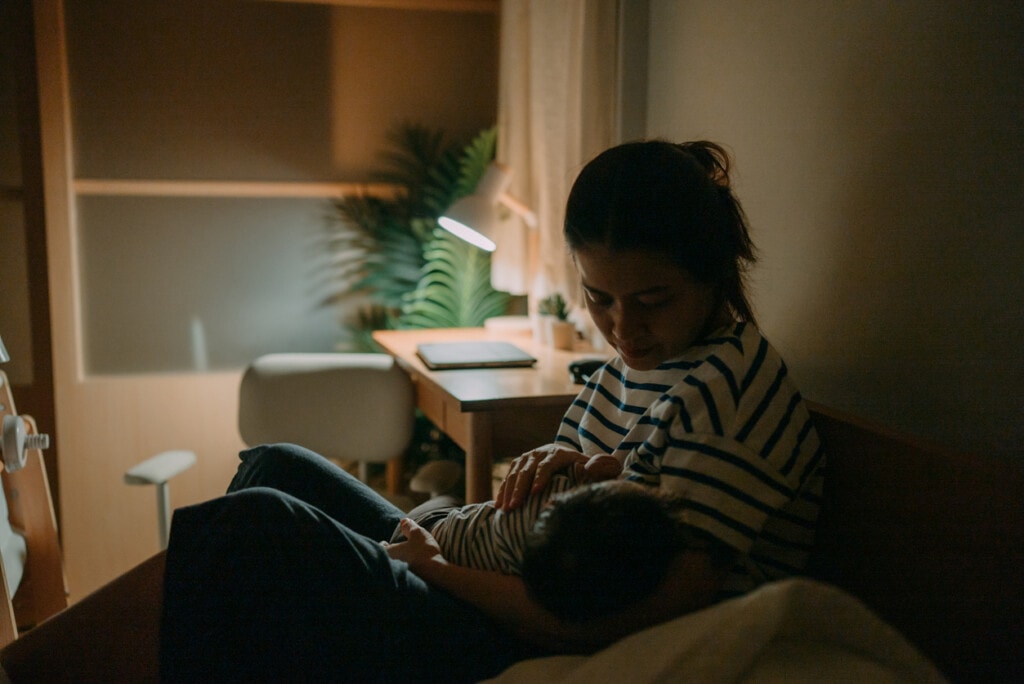Preparing for your baby often means nesting. You’re setting up their room, getting bottles, blankets, clothes washed, etc. And while we all hear about the lack of sleep, most of us don’t take the time to investigate our four-week-old baby’s feeding and sleeping patterns.
Learning about what each stage and age brings can go a long way to ensure you and your new little one get the best sleep possible. If you’re expecting or have a newborn at home, here are the feeding and sleep expectations for your four-week-old baby.
Feeding and Sleep Expectations for Your Four-Week-Old Baby
Feeding Your Four-Week-Old Baby
The feeding schedule expectations can sometimes feel just as complex as sleeping. Knowing when your baby is hungry and how much they need to eat can feel overwhelming for new parents. Four-week-old babies are often prone to eating much more regularly than you do as an adult. They are likely to eat about eight to 12 times a day.1
Babies who consume formula can typically go three to four hours between feedings at this age.2 On the other hand, breastfed babies usually eat roughly every two to three hours because the milk digests faster than formula.2
While measuring breast milk can be tricky if you aren’t pumping, you might wonder how much to feed your baby. The good news is that breastfed babies often do not need to be told just how much they should eat. They will let you know when they are finished by either pushing away from you or falling asleep.3
Formula-fed babies are a bit different. In this instance, they can typically consume about four ounces every four hours.2
Sleep and Your Four-Week-Old Baby
You will encounter many changes in the number of naps, duration, and nighttime sleep hours from birth to six weeks. While it is unlikely that your baby will be sleeping through the night at this stage, knowing what to expect can give you hope for the future.
Generally, one-month-old babies typically need between 14 and 17 hours of sleep daily.4 This means you might not get much play time in. However, you can get plenty of excellent snuggle time with your little one, which is just as crucial for bonding.
Naps
In the beginning, the number of naps they need will vary. Most babies will need to take a long nap followed by an hour or two of wake time. The naps are distributed evenly after the feedings and will gradually grow shorter as babies can stay awake for longer each time they eat.
Naps typically last anywhere from 30 minutes on the shorter end to four hours on the long end. Most new parents see their four-week-old baby sleep about three to four hours each naptime.
Bedtime
New parents long for the first time their baby sleeps through the night. The bad news is that most babies cannot make it eight hours without a snack and some cuddles.
If you are a lucky parent of a “good sleeper,” you might get four to five hours during the first part of the night by the time your baby is four weeks old.
After this first long stretch, you will typically see the same pattern surrounding naps during the daytime. They will go back to sleep after feeding and wake up every two to three hours.
Changes that May Occur
Some common eating and sleeping changes can occur around four weeks of age.
Reflux
Parents may begin to see the first signs of reflux.5 That’s why taking note of any discomfort following a meal is essential. Two of the most common reflux symptoms are excessive spit-up or arching of the back after feeding. In other words, they will do their best to tell you they are incredibly uncomfortable. Another sign might be that they don’t like tummy time and have difficulty lying flat on their back.
If they are spitting up frequently but do not appear to be in pain, rest assured they are just fine if they continue to gain weight.
Transition to Longer Sleep at Night
By four weeks old, most babies are starting to rearrange their sleeping habits to resemble their parents—something new sleep-deprived parents are often eager for!
At this stage of development, babies will start to spend about eight to nine hours of sleep at night and seven hours during the day. Remember that a few nighttime feedings will break up this long stretch.
A Day in the Life of Your Baby
Here is what you can expect from a typical day with a four-week-old. This overview does not include overnight wake-ups, which, as we mentioned, is very normal and can vary from baby to baby.
- 7:00 a.m.: Wake up, feed, and playtime
- 8:00 a.m.: Naptime
- 10:00 a.m.: Wake up, feed, play (including tummy time)
- 12:30 p.m.: Naptime
- 2:30 p.m.: Wake up, feed, playtime
- 4:00 p.m.: Naptime
- 5:00 p.m.: Wake up, feed, bath time
- 6:00 p.m.: Short naptime
- 7:00 p.m.: Wake up, feed, bedtime routine
- 7:30 p.m.: Bedtime
- 9:30 p.m.: Feed, put back to bed
Getting good sleep at night feels elusive and frustrating for some new parents. If that is the case for you and your new little one, you might need support from an experienced pediatric sleep consultant. One-on-one coaching offers you personalized attention, while group coaching allows you to connect with other parents in the same stage of life as your little one. Don’t be afraid to seek support during these early, precious stages.






























